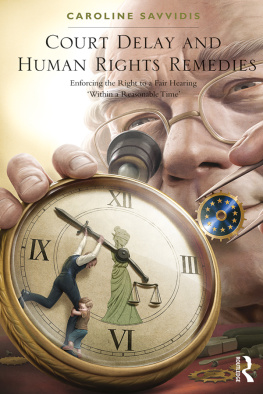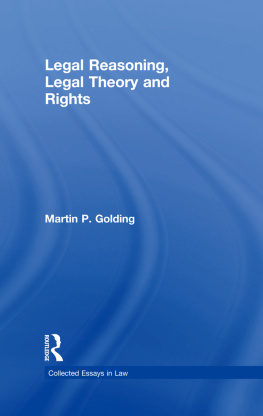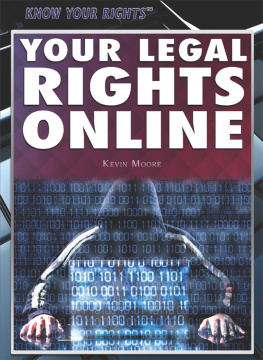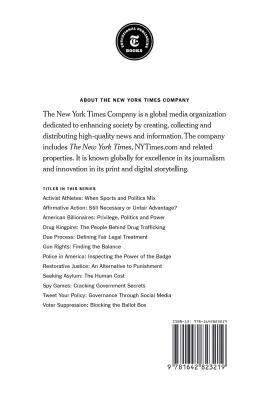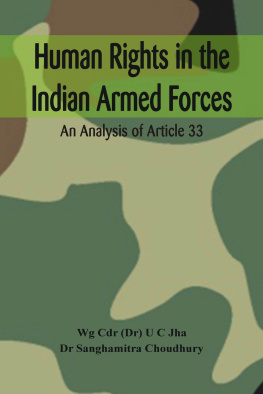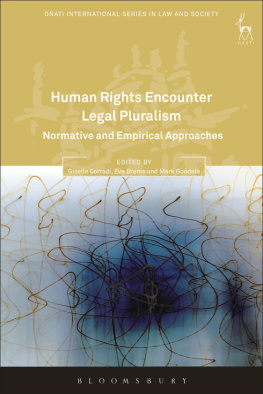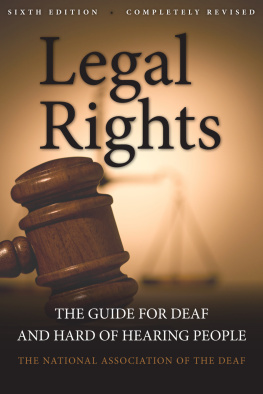Court Delay and Human Rights Remedies
This book brings legal and academic perspective to the theory and practice surrounding the right to a fair hearing within a reasonable time. This field of rights has been somewhat neglected academically, a fact which jars with the sheer volume of case law budding from this single, simple, fundamental right, bearing testimony to the widespread concern with delay in judicial proceedings which transcends the boundaries of states or legal systems.
The work provides a blueprint for analysing the effectiveness of legal remedies across entire legal systems, as well as in any given individual case. The first part focuses on deriving legal principles from the body of jurisprudence of the European Court of Human Rights in Strasbourg, while the second part contains illustrations of the practical application of such principles.
The content constitutes essential reading for students, academics, lawyers, judges, practitioners and all those who wish to understand the issue of delay in judicial proceedings, and the legal context of available remedies. The author aims to raise awareness about the human rights issues which come into play when delivery of justice is delayed, and to provide both an academic and practical reference.
Dr Caroline Savvidis holds a Doctor of Laws degree and is the managing partner of BN&P Advocates, a law firm with a global focus on the resolution of family office issues and the improvement of private and public efficiency in governance and regulation. Dr Savvidis has researched and written extensively on the topic of human rights and legal remedies for court delay; she is a guest lecturer at various universities, and regularly presents at international conferences on issues relating to cross-border regulation, constitutional and human rights law.
This thought-provoking introduction to the study of court delay and human rights remedies provides in-depth analyses of relevant legal issues in the contexts of the European Court of Human Rights and Malta, and serves as a guide to the study of court proceedings and human rights protection from a novel angle. It is written in a lively, accessible and enlightening manner. It contains much that will be invaluable to both the scholars and practitioners in the field of international human rights law, offering dynamic insights into the study of human rights protection and making a significant contribution to the subject. The writing allows the readers to delve deeper.
Professor Shen Wei, Shanghai Jiao Tong University, China
The problem of excessive judicial delays continues to plague many legal systems in Europe and it has given rise to a phenomenal volume of cases before the Strasbourg court. Caroline Savvidiss study of this long-neglected problem is an impressive, insightful contribution which will be of the greatest interest to students, practitioners and governmental reformers.
Professor Vernon Valentine Palmer, Tulane Law School, USA
First published 2016
by Routledge
2 Park Square, Milton Park, Abingdon, Oxon OX14 4RN
and by Routledge
711 Third Avenue, New York, NY 10017
Routledge is an imprint of the Taylor & Francis Group, an informa business
2016 Caroline Savvidis
The right of Caroline Savvidis to be identified as author of this work has been asserted by him/her in accordance with sections 77 and 78 of the Copyright, Designs and Patents Act 1988.
All rights reserved. No part of this book may be reprinted or reproduced or utilised in any form or by any electronic, mechanical, or other means, now known or hereafter invented, including photocopying and recording, or in any information storage or retrieval system, without permission in writing from the publishers.
Trademark notice: Product or corporate names may be trademarks or registered trademarks, and are used only for identification and explanation without intent to infringe.
British Library Cataloguing in Publication Data
A catalogue record for this book is available from the British Library
Library of Congress Cataloging-in-Publication Data
Savvidis, Caroline.
Court delay and human rights remedies: enforcing the right to a fair
hearing within a reasonable time / by Caroline Savvidis.
pages cm
Based on authors thesis (doctoralUniversity of Malta, 2010), issued
under title: The right to a fair hearing within a reasonable time.
Includes bibliographical references and index.
ISBN 978-1-4724-6416-3 (hardback)
1. Speedy trialEurope. 2. European Court of Human Rights.
3. Speedy trialMalta. I. Title.
KJC3832.S63S28 2015
345.24075dc23
2015025307
ISBN: 978-1-4724-6416-3 (hbk)
ISBN: 978-1-3155-7449-3 (ebk)
Typeset in Bembo
by Apex CoVantage, LLC
This table sets out in full the articles cited within the text, for ease of reference. The articles found hereunder do not represent the entirety of the relevant legal instruments. The original or updated legislative acts can be found on the web-site of the respective issuing body or by following the links provided.
International Instruments
Convention for the Protection of Human Rights and Fundamental Freedoms
(European Convention on Human Rights as amended by Protocols No. 11 and No. 14) Full instrument available at:
Article 1
Obligation to respect Human Rights
The High Contracting Parties shall secure to everyone within their jurisdiction the rights and freedoms defined in Section I of this Convention.
Article 2
Right to life
- Everyones right to life shall be protected by law. No one shall be deprived of his life intentionally save in the execution of a sentence of a court following his conviction of a crime for which this penalty is provided by law.
- Deprivation of life shall not be regarded as inflicted in contravention of this Article when it results from the use of force which is no more than absolutely necessary:
- (a) in defence of any person from unlawful violence;
- (b) in order to effect a lawful arrest or to prevent the escape of a person lawfully detained;
- (c) in action lawfully taken for the purpose of quelling a riot or insurrection.
Article 5
Right to liberty and security
- Everyone has the right to liberty and security of person. No one shall be deprived of his liberty save in the following cases and in accordance with a procedure prescribed by law:
- (a) the lawful detention of a person after conviction by a competent court;
- (b) the lawful arrest or detention of a person for noncompliance with the lawful order of a court or in order to secure the fulfilment of any obligation prescribed by law;
- (c) the lawful arrest or detention of a person effected for the purpose of bringing him before the competent legal authority on reasonable suspicion of having committed an offence or when it is reasonably considered necessary to prevent his committing an offence or fleeing after having done so;
- (d) the detention of a minor by lawful order for the purpose of educational supervision or his lawful detention for the purpose of bringing him before the competent legal authority;
- (e) the lawful detention of persons for the prevention of the spreading of infectious diseases, of persons of unsound mind, alcoholics or drug addicts or vagrants;
- (f) the lawful arrest or detention of a person to prevent his effecting an unauthorised entry into the country or of a person against whom action is being taken with a view to deportation or extradition.

